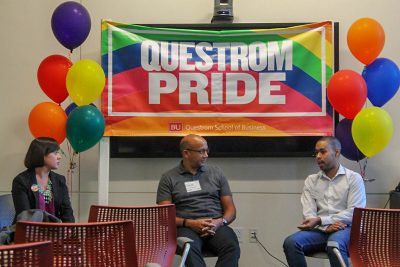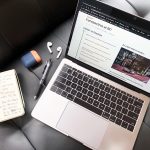
Boston University has created a task force to promote a more inclusive community for its LGBTQ faculty and staff.
The purpose of the LGBTQIA Task Force is to moderate discussions about how BU can become a more inclusive campus to the LGBTQIA community, according to their website. More specifically, its members will seek to gather information from other institutions and corporations on their practices on inclusion for BU to follow.
The task force was officially announced by BU Provost Jean Morrison and Senior Vice President of Operations Gary Nicksa Oct. 25, according to task force co-chair Karen Warkentin.
Since there are already groups and clubs for LGBTQ students, Warkentin said the task force will focus on BU’s faculty and staff.
“There’s a set of things that are relevant to LGBTQIA employees that are distinct from issues relevant to LGBTQIA students,” Warkentin said.
The group plans to host a series of events for community input by listening to people’s experiences, Warkentin said. There is “no need to reinvent the wheel,” she said, when other institutions are already setting an effective example.
Tatiana Morales, a senior in the College of Communication, said she thinks BU faculty should have the opportunity to identify with people who have gone through the same struggles, something they may not have had when they were students themselves.
“They probably didn’t have this kind of openness and environment that we have now for the LGBTQ community,” Morales said, “so it’s probably good for them to have it now.”
Associate Provost for Diversity and Inclusion Crystal Williams had been working to develop and assemble the membership before the official announcement of the Task Force, said Warkentin, who oversees the Task Force along with Director of Labor Relations Judi Burgess.
The task force is composed of 12 faculty and staff members and two co-chairs. Members reflect a diverse range of people within the campus community, Williams wrote in an email.
“I am always pleased when members of the community are willing to participate in the life of the University and in the work of increasing inclusivity at BU,” Williams wrote. “In so doing, they bring incredible value and insight to the questions with which the Task Force has been charged.”
Task force member Anthony Petro, a professor of religion and women’s gender and sexuality studies, wrote in an email that Williams’ presence on campus has brought a positive impact even though she only started working at BU last year. Williams has held listening sessions and lunches among the LGBTQ faculty and staff, Petro wrote, a first in his time as a BU faculty member.
“So many of us had never even seen or known about one another, or just how large and diverse our community is, before last Spring,” Petro wrote. “In terms of simply learning about our community here at BU, these lunches and listening sessions have been wonderful.”
Creating the task force is “the next logical step” in learning from LGBTQ faculty, Petro wrote.
Although the task force is a new initiative, Warkentin said the committee has already received widespread support from LGBTQIA members of the school and other institutions as well.
Cassandra Kalman, a coordinating board member of BU’s Center for Gender, Sexuality and Activism, wrote in an email that groups such as the task force are important because they show support for the community. Kalman wrote that she thinks BU is behind on many LGBTQ issues.
“This could be because of the lack of LGBTQIA+ representation in the administration itself,” Kalman wrote. “But I also do think that the gender-neutral bathrooms (which are almost finished!) are a huge step. Although we are making progress, it is very slow progress.”
Tori Abdalla, a junior in the Sargent College of Health and Rehabilitation Sciences, said she thinks the task force is a good initiative but may encounter challenges along the way, considering that faculty and staff members on the board are from an older generation.
“I do think it is a great resource, but I feel like some faculty and some staff maybe won’t feel that their colleagues are the ones who they want to talk to about their personal life,” Abdalla said. “… I’m not part of the LGBTQ+ community, but I know that some people who are [LGBTQ] and possibly those in the older generation may be very private about it, private about their personal lives.”
Warkentin said BU’s LGBTQ inclusion is better now than in previous years — sexual orientation was absent from BU’s non-discrimination policy when she started working at BU in 2001— but there is still room for improvement.
“It’s vastly better than it was then,” Warkentin said. “We’re moving in a good direction, but there’s a lot more that could be done if we want to really be the best that we can be.”
COM freshman Yiwen Wong said he thinks anything that moves the conversation about LGBTQ inclusivity forward is good.
“You definitely don’t want to be staying at the same place over time,” Wong said, “and having more representations for people who are in minorities is always a better thing than not having it at all.”
Jennifer is studying Communication Studies at the College of Communication in the Class of 2020. She has written for multiple publications and practiced digital marketing throughout her time at Boston University. In Jennifer's spare time, she likes going to brunch and solving puzzles. Connect with her on Twitter at @JSuryadjaja




